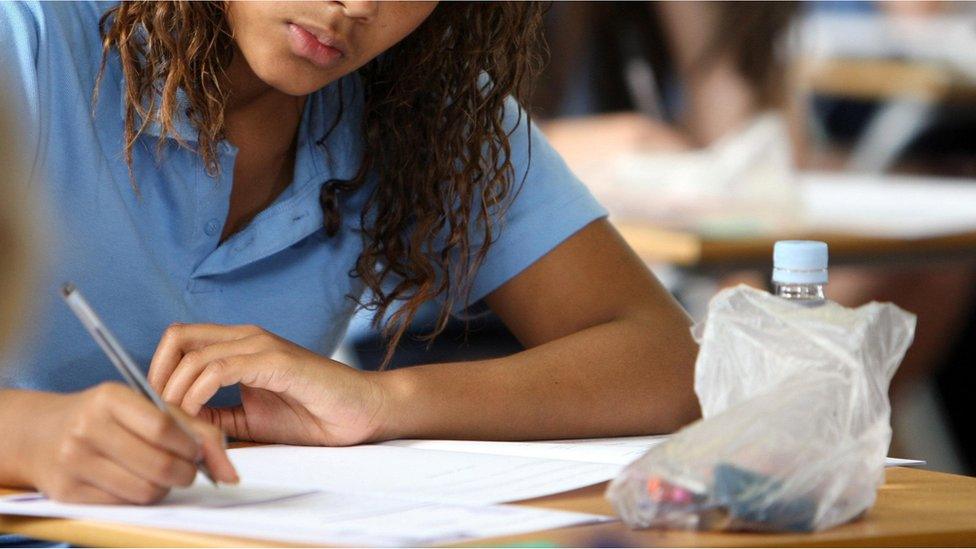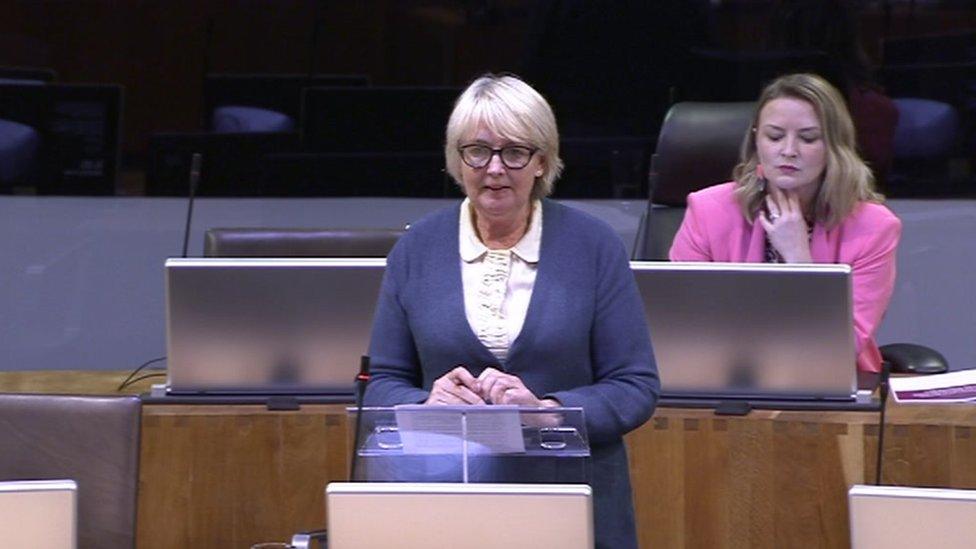A-levels: Mass exam result upgrade 'not expected' in Wales
- Published

Qualifications Wales has said the standardisation of grades was as fair as possible
Mass upgrading of A-Level results should not be needed in Wales despite some predicted grades being lowered, a minister has said.
On Thursday some pupils will get lower results after teachers' predicted grades were deemed "too generous".
In Scotland, tens of thousands of results are being upgraded after outcry over the standardisation process.
But the Welsh Government said the system here was "very different".
The National Union of Students (NUS) has called the moderation of grades a "postcode lottery" and called for the Welsh Government to follow Scotland in reversing the lowering of grades.
NUS Wales President Becky Ricketts warned: "It would be deeply unfair that thousands of students face being marked down because of where they live."
Exams were cancelled due to coronavirus, with results being based on how teachers predict a student would have performed, and formula then applied by the exam board.
Qualifications Wales, the exams watchdog, has already said thousands of A-level and GCSE results will be lowered to account for teachers being "generous" and inconsistency across schools and colleges.
A majority of learners would receive their estimated grade and a small percentage would receive a grade that is higher, it said.
The rest, it said, would receive a lower grade, with "a small percentage" of final grades "two or more grades lower" than they had been estimated.
Analysis by the regulator showed that, based on the estimated grades, more than 40% of A-levels would have been awarded at A* or A compared with 27% in 2019.
At GCSE, 73% would have had an A* to C grade, compared with 62% in 2019.

Scottish students had protested after many saw results downgraded from the estimates of their teachers
In Scotland, about 75,000 pupils will have their results upgraded, after a government u-turn following protests from pupils after results were lowered.
There were concerns that the moderation system unfairly penalised pupils at schools which had historically not performed as well.
There were also concerns pupils said they had been given lower grades than they had achieved in preliminary exams at the start of the year.
Welsh Housing and Local Government Minister Julie James insisted that Wales used different modelling to Scotland and that nearly half of pupils' final mark was based on AS-levels completed last year.
Speaking during the weekly Welsh Government coronavirus briefing on Tuesday, Ms James, said she was confident pupils' grades would be "robust" due to the system used by the examination board WJEC and exam regulator Qualifications Wales.
"I'm really happy to reassure every learner in Wales that the modelling in Wales is very different," she said.
"It takes into account work that has been completed by the students. For example, here in Wales we've never let go of AS-levels.
"If you took A-levels this year then you would have had your AS-level results last year and they contribute 40% to A-level grades.
"So, the model for standardising those grades are developed by the WJEC and approved by Qualifications Wales to ensure that learners are treated fairly and will be able to progress with confidence."
She said that schools would be able to appeal if they need to do so, but it was "too early to say" what the level of appeals might look like.

Siân Gwenllian said pupils must not suffer due to results being downgraded (photo taken prior to lockdown)
Plaid Cymru's education spokeswoman Siân Gwenllian, said was pleased the Scottish Government had recognised their process "was flawed".
"The Welsh process was not dissimilar," she said.
"When the Centre Assessment Grades were deemed to be too 'optimistic', a similar standardisation process was implemented, which used data from previous years.
"As with the situation in Scotland, this may well lead to unfairness for learners in Wales too and I call on Welsh Government to recognise that and to announce what steps they propose to take to rectify the situation."
"Individual learners should not suffer because of a flawed system."

Nervousness about Thursday's exam results won't be limited to pupils and parents.
Within government, the watchdog and exam board there will be apprehension about the reaction when results are published.
They have emphasised there are important differences between the Scottish model for 'standardising' exam grades and the process in Wales, particularly when it comes to this Thursday's A-level results.
But Qualifications Wales have already confirmed that thousands of the grades originally estimated by schools and colleges have been lowered as a result of the process due to 'generous' assessments by teachers.
They say that's essential for consistency, fairness and the credibility of the qualifications, but it is inevitable that some will be unhappy.
What's happened in Scotland will have put everyone on high alert.
And the reaction in England and Northern Ireland which, like Wales, have GCSEs and A-levels and have adopted similar approaches to grading, could also have an impact come results day.
- Published7 August 2020

- Published11 August 2020
